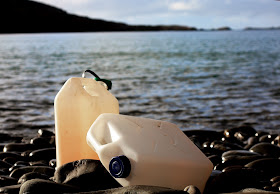Saturday, 14 January 2012
Salt Star Dust
We need salt. It is essential to life. This is true of us and all the other animals, who instinctively look for it in a Salt Lick, as they seek out the natural mineral deposits that provide them with nutrients. Animals find it in the ground, and we find it in the ground, in the sea and, if we are carnivorous, we find it in the animals we eat. Historically hunter tribes never traded in salt. The salt traders were the agricultural tribes. But whichever way we find it, there is no doubt that we need it.
In Salt, A World History Mark Kurlansky writes “Salt deficiency causes headaches and weakness, then light-headedness, then nausea. If deprived long enough, the victim will die. But at no time in this process is a craving for salt experienced. However, most people choose to eat more salt than they need.”
We need salt. We like salt. And, as long as we keep to within our dietry needs, then salt is good for us. Keeping to within our needs is where the problems start - but don't blame the lovely sea salt you shake on your food. That, on average, accounts for just 10 per cent of your average daily intake. Salt has a bad name in terms of health and the reason why is the amount of salt they pack into processed foods. Three-quarters of the average daily salt intake comes hidden in processed foods, with breakfast cereals, bread, cakes and biscuits being the main culprits.
But if we control our intake of it, salt is essential. Its importance is revealed in the amount of salt-derived words that pepper our language: soldier, salad, salacious, salary...
We’ve begun evaporating sea salt from the clean waters of West Cork and the pleasure of collecting wild salt takes on new meaning with an understanding of a bit of basic chemistry. This is the chemistry of the Elements, those indestructible substances that make us and our world. These are the raw trace elements that are part of salt's make-up.
The story of the Elements is thrilling. We may have traded and fought over salt, but the Elements, in their raw state, are something we have worshipped.
Elements begin their life in outer space. It is only through the awesome “big bang” of a dying star, as it explodes into a supernova that enough heat is generated to create an element (gold, lead, silver, carbon etc). The supernova stars in outer space have provided all the material in our world. This is where we have come from, what we breath, see, eat, and what we are.
Salt, when captured in the wild, fuses together over 70 of these elements. So, when you eat real salt, think of it as star dust, for that is what it really is.
Here are some of the star dust trace elements you find in real salt:
Chloride regulates the acid/alkali balance in the body, and is necessary for the production of gastric acid.
Iron is biologically indispensable. It is actually the element that colours our blood red – which has made it the symbol of war, from the planet of Mars.
Sulfur is important for skin, hair and nails.
Magnesium is the main energy source for cell functioning and is necessary for normal muscle contraction.
Potassium stimulates kidney and adrenal functioning, and is important in the biosynthesis of protein.
Calcium builds healthy bones and both Silicon and Manganese help here as well.
Copper supports absorption of iron and vitamin C.
Salt-crusted Steak
This comes from an idea from Skye Gyngell.
Steak (fillet, sirloin, strip-loin, t-bone all would work)
Sea Salt and black pepper
Olive oil
Lemon
Brush the steak with a little olive oil. Heat a grill pan until blazing. Fry the steak for 2-4 minutes depending on the thickness (thicker is better). Meanwhile shake some medium grated sea salt onto a baking tray and grind in some pepper. Turn the steak and cook for another 2-4 minutes. Then remove the steak, place on the salt, and turn so both sides are covered. Leave the steak to rest in the salt for 10 minutes.
Then return the steak to the pan for 1 minute per side, brushing off the salt as it cooks. Serve sliced, drizzled with more olive oil and lemon juice.


I remember reading Kurlanskys 'Salt' years ago and it was a heavy read but very interesting. One of the things that drives me crazy is so many people steer clear of salt and pepper and prefer to allow their guests to add it later themsleves using that low iodine shaker that tastes like hell. A great piece of very informative writing here Sally.
ReplyDeleteThanks Mona. We have a complicated relationship with salt alright.
ReplyDelete